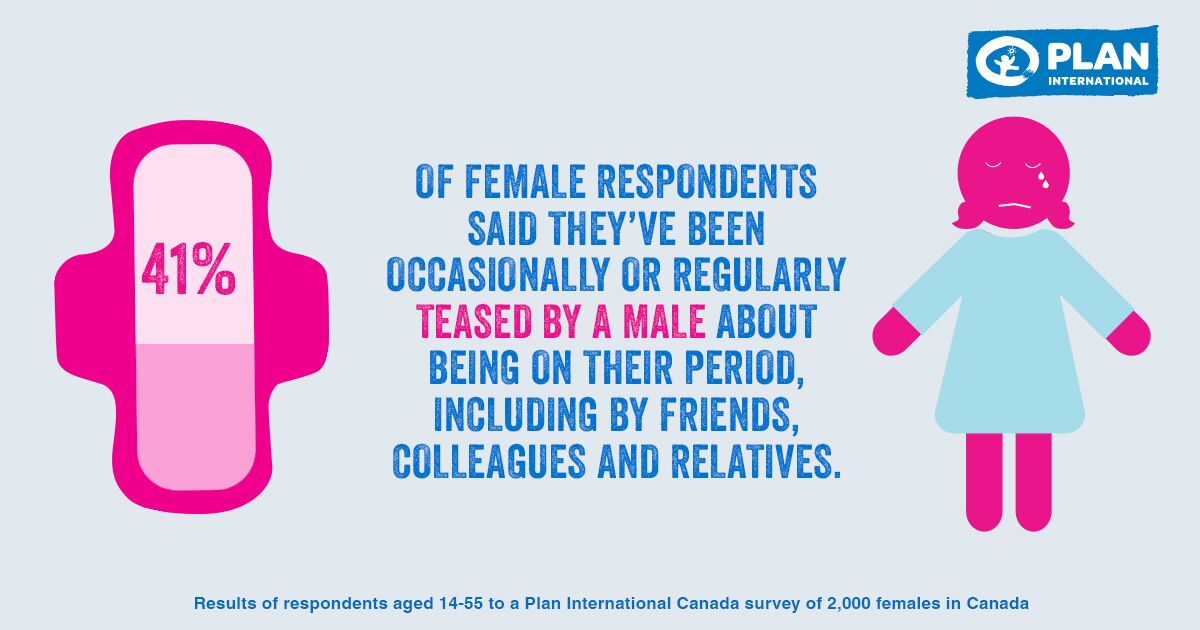To mark Menstrual Hygiene Day on May 28, Plan International Canada today released new data that suggests Canadian menstruators continue to face challenges when it comes to affording, accessing and talking about menstrual hygiene products, amplified by the fact that men and boys remain uncomfortable talking about women’s health, including periods.
The research reveals almost two-thirds of females aged 14 to 55 in Canada have had to miss out on an activity because of their period and concerns about not being able to access menstrual hygiene products, while almost six in ten (58 per cent) have felt the need to lie about being on their period or hide a menstrual product.
The survey results also showed that despite growing public conversation about menstrual products and menstruation, social stigmas strongly persist. Almost half (41 per cent) of female respondents have been teased about being on their period, including by friends, colleagues and relatives. Less than half (47 per cent) of male respondents aged 14 to 55 said they feel comfortable talking about women’s health, including periods. However, it is encouraging that 67 per cent of male respondents felt comfortable purchasing menstrual hygiene products for a family member, and 55 per cent have done so.
“It’s time we make progress on this and recognize that it isn’t only a women’s issue. When we advance the conversation around menstruation and take positive action to address needs, we’re advancing gender equality. It’s about a daughter feeling she can openly talk with her father and his comfort in providing accurate information. Similarly, an employee should be able to walk to the washroom with a menstrual product and not feel the need to hide it,” said Caroline Riseboro, President and CEO of Plan International Canada. “If we want to overcome the challenge of stigma, we must ensure boys and men are included in the conversation. When everyone participates in the discussion, we build understanding, while normalizing the topic of menstruation for all.”

Despite persistent stigmas, the survey also showed significant support for free access to menstrual hygiene products all over the country. Ninety-three per cent of women and girls and 88 per cent of men and boys support or somewhat support free access to menstrual hygiene products in schools around the country, and 81 per cent of women and girls and 77 per cent of men and boys support or somewhat support free access to products in the workplace. There was also strong support for access in homeless shelters and public spaces such as parks, libraries and community centres.
“Access to menstrual hygiene products is a basic human right, not a luxury; and yet not easily obtained by all Canadians,” noted Riseboro. “When one-third of respondents say they have had to sacrifice something else within their budget to afford menstrual hygiene products, it’s clear Canadians who menstruate are not immune to the financial strain. If we want to effect change in an impactful way, more needs to be done to improve access to products and normalize the conversation about menstruation.”
Globally, Plan International Canada has been working hard to end period shaming, engaging boys to discuss and break down menstruation taboos. Through youth clubs, boys also help make reusable sanitary pads, so their female classmates can manage their periods in a healthy and dignified way.
On Menstrual Hygiene Day, the organization is shedding light on the fact that ‘normal’ for too many girls and other menstruators in Canada and around the world means not having access to proper supplies or information to manage their periods safely. Plan International Canada is calling on decisionmakers to ensure young people across the country have access to menstrual hygiene products when they need them. Canadians can advocate for menstrual equity for youth by writing to their Minister of Education and to encourage government and policymakers to #DefyNormal.
Riseboro added, “We applaud British Columbia’s Minister of Education, Rob Fleming, for mandating free menstrual hygiene products in all schools across that province; and we encourage all other Ministers of Education around Canada to follow suit.”
Support for Access
- 34% of women and girls in Canada have had to regularly or occasionally sacrifice something else within their budget to afford menstrual products.
- 63% of women and girls have regularly or occasionally missed an activity because of their period and concerns about not being able to access menstrual hygiene products or proper facilities.
- 93% of female respondents and 88% of male respondents support or somewhat support having menstrual hygiene products for free in schools.
- 81% of women and girls, and 75% of men and boys support or somewhat support having menstrual hygiene products for free in the workplace.
Impact of Stigma
- 58% of female respondents said they occasionally or regularly felt the need to lie about being on their period or hide a menstrual product.
- 41% of female respondents said they’ve been occasionally or regularly teased by a male about being on their period, including by friends, colleagues and relatives.
Research citation
Plan International Canada. Female and male views on menstruation in Canada. May 2019. <http://plancanada.ca/periods-matter>
Ways to Take Action on Menstrual Hygiene Day:
- Visit plancanada.ca/periods-matter and use our letter template to write to your Minister of Education to advocate for free menstrual hygiene supplies in public schools.
- Learn more about the issue of menstrual equity and join the conversation with @plancanada online on Twitter, Instagram and Facebook using #DefyNormal and #MHDay2019.
- Purchase the Hygiene Kit for Girls Gift of Hope, which directly supports girls around the world with the basic supplies they need to manage their health in a dignified way, including their periods.

